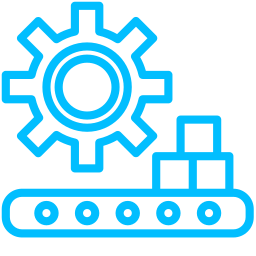Process Automation
Process automation with machine learning enhances efficiency, reduces manual tasks and drives data-driven productivity.

Role of Machine Learning
Nestack Technologies streamlines workflows with machine learning, driving operational excellence, cost savings, and improved customer experiences.
Intelligent Document Processing
Machine learning algorithms can automate document processing by extracting information from unstructured data like invoices and emails. This eliminates manual data entry and speeds up workflows. A financial services firm used these algorithms to process loan applications faster and more accurately, leading to quicker approvals and higher customer satisfaction.
Customer Service Automation
Machine learning algorithms can automate customer service by analyzing inquiries and sentiment. Businesses can use natural language processing to create chatbots that quickly and accurately respond to customer queries, improving response time and customer satisfaction. A telecommunications company implemented a chatbot that reduced the load on human agents and enhanced customer satisfaction by providing personalized responses based on customer queries and historical interactions.
Supply Chain Optimization
Machine learning algorithms can optimize supply chain processes by analyzing historical data and demand patterns. This automation can reduce costs, minimize stockouts, and improve performance. A global retail chain used these algorithms to optimize inventory management, resulting in lower carrying costs, fewer stockouts, and higher profitability.
Fraud Detection and Risk Management
Machine learning algorithms can automate fraud detection by analyzing data to detect anomalies and patterns. This helps businesses protect sensitive information and minimize financial losses. A major bank used these algorithms to identify and block suspicious activities in real-time, improving security measures. Machine learning has become a transformative technology for various industries.
How We Help
Nestack Technologies harnesses the power of machine learning to transform and optimize various business processes.
Smart document processing
Nestack can extract relevant information from unstructured data, such as invoices, contracts and emails, automating the document processing workflow. We accurately capturing and categorizing information to eliminate manual data entry and document processing.
Develop virtual assistants
Nestack can analyze customer inquiries, sentiment, and historical interactions to automate customer service processes. We leverage NLP to enable businesses develop virtual assistants or chatbots that provide quick and accurate responses to customer queries, reducing response time.
Optimize supply chain processes
We can analyze historical data, demand patterns and external factors to optimize supply chain processes. By forecasting demand, inventory automation and optimizing logistics, businesses can reduce costs, minimize stockouts and improve overall supply chain performance.
Automate fraud detection
Nestack Technologies can analyze large volumes of data to detect anomalies, identify patterns and mitigate risks. We automate fraud detection processes, allowing businesses to proactively detect fraudulent activities, protect sensitive information and minimize financial losses.
Industry Use Cases
Machine learning process automation enables industries to enhance efficiency, reduce errors, and make data-driven decisions.
Healthcare
Improves patient care and outcomes by automating diagnostic procedures and personalizing treatment plans.
Financial
Enhances fraud detection and risk management by analyzing transaction patterns and customer behavior.
Manufacturing
Optimizes production processes, reduces downtime, and enhances quality control through predictive maintenance and real-time monitoring.
Retail
Personalizes customer experiences, optimizes inventory management, and forecasts demand to enhance operational efficiency.
Telecom
Automates network management and improves customer service through predictive analytics and customer usage pattern analysis.
Transportation
Enhances route optimization, freight management, and predictive maintenance to reduce costs and improve service reliability.
Energy
Optimizes energy distribution, predicts equipment failures, and automates grid management to improve efficiency and sustainability.
Media
Personalizes content recommendations and optimizes advertising strategies through viewer behavior analysis.
Real Estate
Automates property valuation and enhances market analysis through data aggregation and predictive analytics.
Agriculture
Increases yield and optimizes resource use by automating crop management and monitoring environmental conditions.

Healthcare
Improves patient care and outcomes by automating diagnostic procedures and personalizing treatment plans.

Financial
Enhances fraud detection and risk management by analyzing transaction patterns and customer behavior.

Manufacturing
Optimizes production processes, reduces downtime, and enhances quality control through predictive maintenance and real-time monitoring.

Retail
Personalizes customer experiences, optimizes inventory management, and forecasts demand to enhance operational efficiency.

Telecom
Automates network management and improves customer service through predictive analytics and customer usage pattern analysis.

Transportation
Enhances route optimization, freight management, and predictive maintenance to reduce costs and improve service reliability.

Energy
Optimizes energy distribution, predicts equipment failures, and automates grid management to improve efficiency and sustainability.

Media
Personalizes content recommendations and optimizes advertising strategies through viewer behavior analysis.

Real Estate
Automates property valuation and enhances market analysis through data aggregation and predictive analytics.

Agriculture
Increases yield and optimizes resource use by automating crop management and monitoring environmental conditions.
Hire ML Engineer
Outsourcing to Nestack guarantees top-notch ML development solutions, supported by a skilled team and world-class facilities.
- 8 hours a day
- 5 days a week
- Dedicated resource
- 4 hours a day
- 2 hours a day
- 5 days a week
- Budget-friendly
- 80 hr commitment
- One-time tasks

FAQ'S
In which industries do your ML developers have experience?
Nestack’s Machine Learning developers have a broad range of expertise and are capable of handling AI/ML development projects across various sectors. However, we have a specialized focus on industries such as Banking, Manufacturing, Healthcare, Information Technology, Insurance, Retail, and Food.
What services can Nestack's ML engineers provide for you?
Nestack’s team of machine learning engineers offers a wide range of services, including comprehensive ML consulting, tailored ML-powered software development, Natural Language Processing (NLP) solutions, computer vision solutions, business intelligence and analytics solutions, deep learning solutions, and Robotics Process Automation. Additionally, we provide ongoing support and maintenance services post ML development.
Do you provide ongoing support and maintenance for machine learning solutions?
Yes, Nestack offers continuous support and maintenance for your machine learning solutions. For maintenance needs, there’s no need to employ a full-time programmer, as we offer a flexible bucket model that allows you to access dedicated support and maintenance services whenever necessary.
Are the ML experts from Nestack available to work in my time zone?
Our standard working hours are from 10 AM to 7 PM IST (Monday to Friday). However, our hired developers can accommodate scheduling adjustments of approximately +/- 3 hours from regular office hours for calls or meetings.
Does Nestack ensure the confidentiality of a client's intellectual property?
Nestack is committed to protecting the confidentiality of our clients’ intellectual property at all times. This includes signing a non-disclosure agreement (NDA) at the outset of the project, securely storing code in private Git repositories, and ensuring all formalities related to code ownership and copyrights are properly handled upon project delivery.
Looking for flexible hiring options with Nestack?
With Nestack, scale your business wisely by hiring proficient developers on a part-time or full-time basis, managing your burn rate efficiently while accelerating growth. Monthly service level support includes 8 hours/day for Full Time, 4 hours/day for Part Time, 2 hours/day for Part Time, and 5 hours/week for Part Time (on demand).






